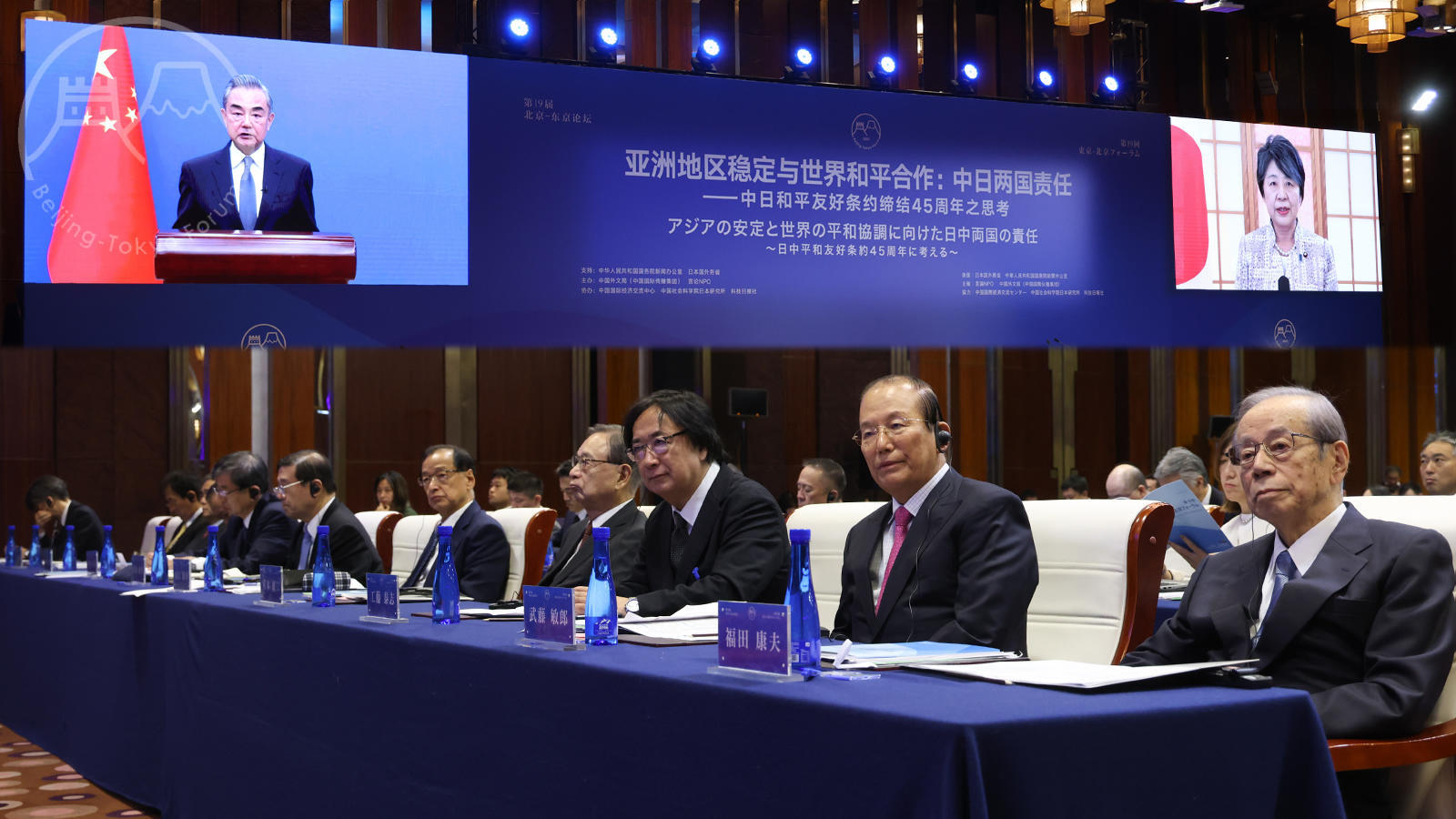The 19th Tokyo-Beijing Forum was held in Beijing, China on October 19 and 20, 2023. This was the first time in four years that the forum had been held in-person, and 40 individuals from Japan visited Beijing to take part.
This forum is the only Track 1.5 forum between Japan and China, and it has been held annually for the last 19 years without interruption, even as diplomatic relations between Japan and China have substantially worsened.
Conflict continues around the world, with the Russian invasion of Ukraine and the war between Israel and Palestine, and even in Asia, the situation in the Taiwan Strait remains tense all while North Korea is increasing its nuclear weapon and missile capabilities.
This year's forum focused on discussions on how to restore the peaceful order in Asia and around our increasingly divided world, with seven breakout sessions engaging in frank discussion about how Japan and China can work together to achieve peace, both regionally and globally.
Participants worked through the night to formulate a joint declaration between Japan and China that was announced on the final day.
Coincidentally, the day before the Tokyo-Beijing Forum opened, Chinese President Xi Jinping hosted an international forum on the global economic development plan known as the Belt and Road Initiative. President Xi welcomed Russian President Vladimir Putin to China, and the two leaders affirmed the solidarity the two countries share. These events become the topic of conversation during the Japan-China dialogues that took place in the same city the following day.
First nuclear talks result in agreement to move closer to a world without nuclear weapons
Approximately 100 experts from Japan and China participated in seven breakout sessions ? politics and diplomacy, national security, nuclear weapons, economy, digital technologies, media, and youth ? and particular attention was given to the discussions on nuclear weapons and politics and diplomacy.
In China, the nuclear weapon sector is considered both secret and vitally important, and as such, discussions on the topic between Japan and China are rare. However, in the public opinion surveys conducted in Japan and China directly before the forum, it was found that more than half of Chinese respondents and just under 40% of Japanese respondents feel that nuclear war is possible in the world right now. Moreover, many of the respondents in both countries that fear a potential nuclear war do so because of President Putin's threats to use nuclear weapons in its invasion of Ukraine, and because nuclear powers are making progress in building smaller nuclear weapons that are easier to use. These developments may have helped make the nuclear talks between Japan and China possible.
The eleven participants in the Nuclear Weapons Breakout Session included experts and other stakeholders with knowledge of nuclear weaponry, diplomacy, and security, and the discussion touched upon control of nuclear weapons, the responsibilities of nuclear powers, and the release of treated water from Japan's Fukushima Daiichi Nuclear Power Plant. While often heated, the discussion did end with an agreement to collaborate in reducing nuclear proliferation in Asia and around the world, and to cooperate in working towards building an ideal world without nuclear weapons. This agreement was successfully incorporated into the Joint Declaration.
Can the two countries really cooperate in restoring a peaceful global order?
The Politics and Diplomacy Breakout Session discussed the fact that October 2023 marked the 45th anniversary of the signing of the Treaty of Peace and Friendship between Japan and China, with a focus on what participants thought about the current situation in which the Treaty is not functioning as designed.
The Treaty was written to ensure that the two countries would abide by the principles of the United Nations Charter and resolve any issues they encountered through peaceful dialogue, and that both would work towards peace and prosperity in Asia and around the world. However, since its signing, there has been little bilateral dialogue about those goals, and intergovernmental diplomacy has remained equally sluggish.
The discussion delved deep into the current global situation of increasing fragmentation, and into Russia's invasion of Ukraine being a blatant violation of the United Nations Charter principles about using peaceful means to resolve conflict.
The session ended in an agreement to reconfirm the original goals of the Treaty, to ensure it functions as a tool for avoiding conflict in Asia, and to work together to restore the peaceful global order. The Joint Statement also included a proposal to the two nations' governments to establish a permanent dialogue that will aid in accomplishing these goals.
The Breakout Session on Economy was attended by a great number of individuals, and this was only partly due to the deteriorating real estate market making the future of China's economy uncertain. It was also the first time that experts from both countries had had a frank discussion about how to tackle the anti-espionage law and other initiatives that illustrate the loss of trust in Japanese corporations and how they operate in China.
There was no objection from Chinese participants when the following proposal was included in Joint Statement: corporations should not be required to take on more risk than necessary; cooperation is premised upon respecting corporate autonomy in business and increasing the predictability of future regulations.
Final Japan-China Track 1.5 agreement to bring all forms of dialogue back on track
During the ceremony held before the forum on October 18, just after President Putin had left Beijing, a congratulatory message from Japanese Prime Minister Fumio Kishida was delivered to the attendees, and during it he emphasized the extreme importance of dialogue with China.
The Joint Statement also emphasized the necessity of bringing all forms of dialogue between the countries back on track.
During November's APEC Summit, President Xi met with US President Joe Biden, and also met with Prime Minister Kishida. There is no doubt that the Tokyo-Beijing Forum helped lay the foundations for that meeting between the leaders of Japan and China.

Post a comment